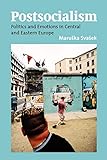Postsocialism : Politics and Emotions in Central and Eastern Europe / ed. by Maruška Svašek.
Material type: TextPublisher: New York ; Oxford : Berghahn Books, [2006]Copyright date: ©2006Description: 1 online resource (244 p.)Content type:
TextPublisher: New York ; Oxford : Berghahn Books, [2006]Copyright date: ©2006Description: 1 online resource (244 p.)Content type: - 9781845455347
- 9780857455598
- 306.0947 23
- HN380.7.A8 S93 2008
- online - DeGruyter
| Item type | Current library | Call number | URL | Status | Notes | Barcode | |
|---|---|---|---|---|---|---|---|
 eBook
eBook
|
Biblioteca "Angelicum" Pont. Univ. S.Tommaso d'Aquino Nuvola online | online - DeGruyter (Browse shelf(Opens below)) | Online access | Not for loan (Accesso limitato) | Accesso per gli utenti autorizzati / Access for authorized users | (dgr)9780857455598 |
Frontmatter -- Contents -- Introduction: Postsocialism and the Politics of Emotions -- 1. Nostalgia and the Emotional Economy: a Comparative Look at Rural Russia -- 2. Social Suffering and Political Protest: Mapping Emotions and Power among Pomaks in Postsocialist Bulgaria -- 3. Sentiments and/as Property Rights: Restitution and Conflict in Postsocialist Romania -- 4. Postsocialist Ownership: Emotions, Power and Morality in a Czech Village -- 5. Claiming Ownership in Postwar Croatia: the Emotional Dynamics of Possession and Repossession in Knin -- 6. ‘The First Europeans’ Fantasy of Slovenian Venetologists: Emotions and Nationalist Imaginings -- 7. Strategies of Resistance in the Polish Campaign against EU Membership -- 8. The Misgivings of Democracy: Personal Resentment and Alternating Power in a Czech Village -- 9. The Dynamics of Trust and Mistrust in Poland: Floods, Emotions, Citizenship and the State -- Afterword -- Notes on Contributors -- Index
restricted access online access with authorization star
http://purl.org/coar/access_right/c_16ec
In many parts of post-socialist Europe the tumultuous political and economic developments have generated strong emotions, ranging from hope and euphoria to disappointment, envy, disillusionment, sorrow, loneliness, and hatred. Yet these aspects have been largely neglected in analyses of the profound transformations that have taken place in Central and Eastern Europe since 1990. Based on a wide variety of ethnographic case studies focusing on Russian, Siberian, Romanian, Bulgarian, Slovenian, Croatian, Czech, and Polish communities, this volume proves the significance of emotions to post-socialist political processes as an inherent part of the transformations and sheds new light on the impact of local, national, and transnational political forces that have given rise to the resurgence of nationalist sentiments, increasing poverty and marginalization, conflicts arising from the restitution of state property, constitutional changes, and economic deprivation.
Mode of access: Internet via World Wide Web.
In English.
Description based on online resource; title from PDF title page (publisher's Web site, viewed 25. Jun 2024)


